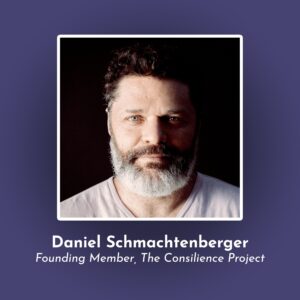
Show Summary
On this episode, Daniel Schmachtenberger returns to discuss a surprisingly overlooked risk to our global systems and planetary stability: artificial intelligence. Through a systems perspective, Daniel and Nate piece together the biophysical history that has led humans to this point, heading towards (and beyond) numerous planetary boundaries and facing geopolitical risks all with existential consequences. How does artificial intelligence, not only add to these risks, but accelerate the entire dynamic of the metacrisis? What is the role of intelligence vs wisdom on our current global pathway, and can we change course? Does artificial intelligence have a role to play in creating a more stable system or will it be the tipping point that drives our current one out of control?
About Daniel Schmachtenberger
Daniel Schmachtenberger is a founding member of The Consilience Project, aimed at improving public sensemaking and dialogue.
The throughline of his interests has to do with ways of improving the health and development of individuals and society, with a virtuous relationship between the two as a goal.
Towards these ends, he’s had particular interest in the topics of catastrophic and existential risk, civilization and institutional decay and collapse as well as progress, collective action problems, social organization theories, and the relevant domains in philosophy and science.
In French, we have a motto that says that a simple drawing is often better than a long explanation. Jean-Marc Jancovici Carbone 4 President
That’s very understandable because with left atmosphere thinking, one of the problems is that you see everything as a series of problems that must have solutions. Iain McGilchrist Neuroscientist and Philosopher
We can’t have hundreds and hundreds of real relationships that are healthy because that requires time and effort and full attention and awareness of being in real relationship and conversation with the other human. Nate Hagens Director of ISEOF
This is the crux of the whole problem. Individual parts of nature are more valuable than the biocomplexity of nature. Thomas Crowther Founder Restor
Show Notes & Links to Learn More
Download transcript00:00 – Daniel Schmachtenberger info + TGS episodes part 1 and part 2 and part 3 and part 4 + part 5
Overview of Nate’s story: Animated videos, Economics for the Future – Beyond the Superorganism
Daniel’s recommendations on further AI learning: Eliezer Yudkowsky on Bankless, David Bohm & Krishnamurti Conversations, Iain McGilchrist – The Master and His Emissary, Robert Miles Videos on AI
00:03 – ChatGPT, AI art and programming, Deep Fakes
04:25 – Humans are a social species
05:17 – Money is a claim on energy
05:25 – Fossil energy is incredibly powerful – but finite
05:39 – Other non-renewable inputs to the economy
06:44 – Money is primarily created through commercial banks – but increasingly through central banks
06:52 – Interest is not created when money is created
07:50 – How AI obscures the truth and hurts social discourse
08:54 – How AI affects jobs
09:30 – Humans unique problem solving intelligence
11:22 – 100 million users in 6 weeks for ChatGPT – faster adoption than any technology ever
12:31 – Cognitive bias – Nate’s work on cognitive bias
16:01 – Indigenous genocide and culture destruction, extinct and endangered species
23:06 – Unabomber critique of the advancement of technology
23:21 – Indigenous perspectives that resist the adoption of certain tech
24:34 – Genghis Khan, Alexander the Great
26:35 – Adoption of the plow and loss of animism
28:56 – Antonio Turiel + TGS Podcast
31:40 – Humans long history of environmental destruction
32:45 – We are hitting planetary boundaries everywhere
34:20 – Facebook’s advertising algorithm’s adverse societal effects
36:25 – Golden Retriever’s co-evolution with humans
39:32 – Jevons Paradox
40:05 – Since 1990s we’ve increased efficiency 36% but increased 63% increase in energy use
41:02 – Orders of effects
45:50 – Maximum Power Principle
47:32 – There are lots of different types of intelligence
48:20 – Other hominids
53:09 – Human ability to have abstractions of time and space
54:38 – Laozi – Tao Te Ching
57:14 – Studies showing people dying of obesity are dying of nutrient deficiency
1:02:15 – Co-selecting factors of evolution – homeodynamics
1:04:30 – Tyson Yunkaporta
1:05:00 – Samantha Sweetwater
1:07:23 – The Sabbath
1:13:04 – Chesterton’s Fence
1:13:50 – Dialectics
1:21:08 – E.O. Wilson & David Sloan Wilson – Multilevel Selection
1:24:25 – Recursive Innovation
1:26:15 – Dunbar’s Number
1:30:09 – Hobbesian State of Nature
1:32:10 – Humans are not specifically adapted to any particular environment
1:32:25 – Neoteny in humans.
1:39:37 – Economic Comparative Advantage
1:40:30 – Nate’s 2023 Earth Day Talk
1:43:25 – Origins and types of capitalism
1:46:02 – Ilya Prigogine
1:46:22 – Moloch
1:46:55 – Adam Smith – Invisible Hand
1:50:32 – Eliezer Yudkowsky
1:50:35 – Nick Bostsrom
1:51:05 – AI systems prowess at chess and other military strategy games
1:54:03 – Swarming algorithms and AI regulation of flight patterns
1:56:40 – Humans lack of intuition for exponential curves
2:04:04 – WarGames
2:04:06 – Mutually Assured Destruction
2:05:40 – Open AI
2:06:12 – Anthropic
2:06:52 – Motivated Reasoning
2:08:38 – Technology is Not Values Neutral paper
2:15:45 – Unknown unknowns – Donald Rumsfeld
2:19:50 – Shareholder Value
1:33:25 – Energy and resource needs of AI
2:39:15 – Eliezer Yudkowsky on Bankless
2:39:40 – Machine Intelligence Research Institute
2:49:07 – Risk of Generalized Artificial Intelligence
2:59:55 – David Bohm & Krishnamurti Conversations
3:02:59 – Ian McGilchrist – The Master and His Emissary
3:10:01 – Robert Miles Videos on AI







